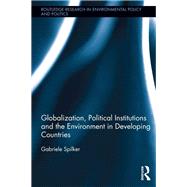Globalization, Political Institutions and the Environment in Developing Countries
, by Spilker; Gabriele S.- ISBN: 9780415638494 | 0415638496
- Cover: Hardcover
- Copyright: 12/8/2012
Though industrialized countries are usually the ones indicted when environmental pollution is discussed, over the few last years the rate of emissions in developing countries has increased by a startling amount. The fallout from this increase is evidenced by the struggle of cities like Beijing to improve their air quality. Yet there also exist developing countries such as Thailand that have managed to limit their emissions to more tolerable levels, raising the question: why are some developing countries more willing or able to take care of their environment than others? In this volume, Gabriele Spilker proposes two factors for the differences in developing countries' environmental performance: integration into the international system and domestic political institutions. Focusing on developing countries generally but also closely examining important global powers such as China and India, Spilker employs a rigorous quantitative analysis to demonstrate the importance of considering various aspects of the international system, in order to draw more comprehensive conclusions about how globalization affects environmental performance.She asserts that democratic political institutions can shield developing countries from the negative consequences of either trade or foreign direct investment. But at the same time, developing countries, by avoiding demanding commitments, are more likely to use environmental treaties as a cover than as a real plan of action. Adding a new dimension to the existing body of research on environmental quality and commitment, Spilker convincingly demonstrates how international and domestic political factors interact to shape developing countries' ability and willingness to care for their natural environment.







